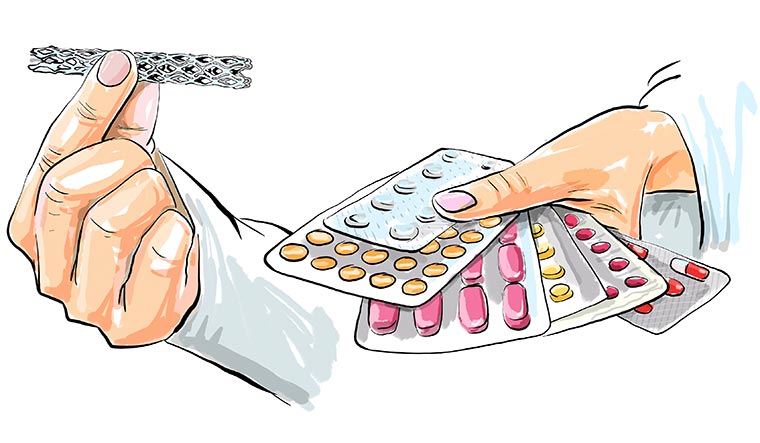You have probably read or heard the recent news headlines about a trial that showed cardiac stents and bypass not being any better than medications. Like most headlines, this information is only partly true and, unlike what has been touted, not entirely new either.
Now before you call your cardiologist or cardiac surgeon and ask for a refund, let me guide you through the fine print—and there is a lot of it. The first being patients who recently had a heart attack or worsening symptoms were excluded. In these patients, stents and bypass surgery definitely saves lives. In addition, the sicker patients, people with weak heart pumps and people with high-risk anatomy were excluded.
The ISCHEMIA trial was presented at the American Heart Association. A total of 5,179 patients with stable blockages were treated by either stents and bypass or medications. There was no statistical difference in the groups for major adverse cardiac events at 3.3 years followup—13.3 per cent in the stent and bypass group had adverse events as opposed to 15.5 per cent in the medical group (a 2.2 per cent difference which was considered insignificant).
Now for more fine print. Only 80 per cent in the stent or bypass group actually got stents or bypass. Now how is this possible, you may ask. In trials, they use a method called intent to treat. Once assigned to a treatment group , you are counted as receiving the treatment, whether you actually get it or not. I know, I know, it sounds absurd, but welcome to the world of statistics where intent matters. Thank God, it doesn’t hold true for real life, right?
In addition, 23 per cent of patients in the medication only arm got stents or bypass during this period as a bailout as they became unstable. A further analysis showed that there was a 30 per cent reduction in heart attacks in the stent/bypass arm. This was an unexpected surprise because we believed that disease of the arteries generally involved all arteries, and stenting one or two arteries would not stop another area from closing off, leading to a heart attack. This reduction in heart attacks, however, did not lead to a reduced mortality rate. The reason: we have gotten better in treating heart attacks. In addition, the patients in the stent/bypass had less chest pain and improved quality of life.
Confused? Let me try and break it down. If you have minimal symptoms and a blockage in an artery not supplying a major area in your heart, you should do well with medication, with stents/bypass as an option if you worsen symptomatically. This trial is in line with previous trials that tell cardiologists to definitely hit the pause button before pursuing a more aggressive/invasive strategy. Generally, the sicker you are, the more likely you will benefit from aggressive treatment.
Cardiac stenting is big business (around $50 billion big in the US) for companies, hospitals and doctors. There have been cases of hospitals and doctors overusing stents, which has led to a rightful scepticism and bad press associated with stents. This is an area in which we as the cardiology community have been open to regulation, peer review and strict enforcement.
The problem with the practice of medicine today is that it is population based. What’s good or bad for a group is considered good or bad for you. While this may be correct in most cases, individuals are unique and have different goals. That is where your doctor comes into the picture. She/he knows you as a person, and can tailor therapy based on what you need as an individual. Don’t believe me? Ask your doctor.
The writer is chief of staff, Florida Hospital Memorial Medical Center, Daytona Beach, US.


